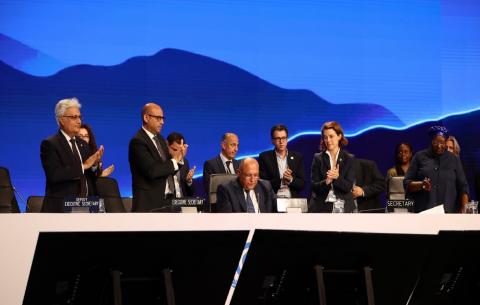- Promote the frequency, continuity and mainstreaming of climate change in information, outreach and entertainment.
-
Communicate the causes, impacts and especially the solutions to promote a forward-looking ecological transition.
-
Promote an approach to the problem from the point of view of a just and inclusive ecological transition that avoids inequalities.
-
Connecting climate change with realities close to us in space and time, framed by lifestyles, to show that this phenomenon is not a future but a present.
-
Disseminate initiatives undertaken or led by citizens.
-
Defend critical and independent journalism.
- Defend material and human conditions.
- Advocate for journalism committed to truth so that commercial funding does not interfere with content.
- Advocate for compliance with the "Self-Regulatory Code on Environmental Claims in Marketing Communications".
-
Communicate and disseminate scientific research on climate change.
- Communicate the reports of the United Nations Intergovernmental Panel on Climate Change (IPCC).
- Scientists should be the main source of scientific information and should be equally served by all media, regardless of their coverage and their generalist or specialised nature.
- Use narrative formats adapted to different audiences.
- To disseminate the remarkable scientific research generated in universities and research centres.
-
Disseminate the specific concepts and terms necessary to understand the phenomenon.
"Greenhouse effect", "carbon footprint", "ecological footprint", "decarbonisation", "GHG emissions", "sustainability", "per capita emissions", "biodiversity", "sustainable development", "planetary boundaries", "tipping points" and "the principle of common but differentiated responsibilities", among others, with particular emphasis on the wide diversity of adaptation measures and solutions.
-
Connecting climate change with extreme weather events (EMEs).
- Explain the difference between the concepts of "weather" and "climate" and emphasise that these WEFs will become more frequent and virulent due to climate change.
- Develop attribution studies in relation to the historical frequency of measurement of these values when WEFs occur.
-
Improve the communication treatment of climate change.
- Renouncing false symmetry.
- Revealing denialism in economic discourse, political discourse or advertising, and warning against "defeatism".
- Debunking fake news and false truisms, giving scientists a voice.
- Favour genres and formats that allow contextualisation and deepening.
- Avoid partisan, non-science-based interests in climate change communication.
- Gender mainstreaming.
- Avoid blaming the public and direct the demand to those who have the power to effect change.
-
Innovating in climate change communication.
Communicate in different spaces (traditional media, social media, digital platforms, etc.) and in different genres and formats using innovative narrative strategies and tools (metaverse, gamification, etc.).
-
Promote climate change education and communication.
- Enhancing the "formative" function of the media as institutions of social communication.
- Consider environmental education professionals as sources of information and mediators.
- Encourage transversal training of communication professionals.
Methodological notes: the 2018 Decalogue has been updated with social research techniques in communication. Based on the diagnosis of climate change communication in different media provided by the reports issued by the Climate Change Communication Observatory since its launch in 2019, work has been carried out annually with communication professionals to evaluate the social communication of climate change and the principles of the Decalogue. In 2021, it was updated in three phases:
- A day of conversations using the Phillips 66 technique. 42 communication professionals and experts participated together with the Observatory's researchers. It was held under the auspices of the Unesco Chair of Communication Research of the URJC.
- Discussion of the results in an online working session in which 30 communication professionals and experts participated.
- After validation of the results, the Decalogue/Guideline for Climate Change Social Communication (2022) was drafted.




